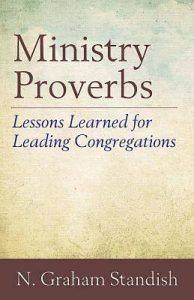Healthy churches know why they do what they do, says pastor and author Graham Standish. When what we do is based on a clear why, we act with purpose. When we don’t know why we do what we do, we lose focus.
Why do some churches flourish and others struggle? Those that flourish generally know why they do what they do. Those that struggle typically only know what they do. Why do we continue to host the strawberry festival year after year, when few people come anymore? Why do we insist on playing mostly the same hymns today that were sung in the 1950s? Why do we insist on saying “We’ve always done it this way,” when clearly that way is no longer working because people are no longer coming?
When we understand clearly why we are doing what we are doing, and when this why is based on a compelling purpose, it leads to creative, dynamic, and inspiring mission.
Most mainline churches are experts in knowing what to do, but they’re generally lost as to why they do what they do. And understanding why is the key to health, growth, and renewal. Why is vision. It is the ability to understand where we want to go or, more specifically, where we are called to go and what our purpose is in doing so. When we understand clearly why we are doing what we are doing, and when this why is based on a compelling purpose, then it leads to creative, dynamic, and inspiring mission.
Unfortunately, many pastors and church leaders with vision are great at understanding why, but stink at actually figuring out what needs to be done to accomplish their why. This is the struggle for many seminary theologians who are good at saying what the church’s purpose is (in other words, the why underlying a church’s ministry and mission), but can’t tell people how to pragmatically accomplish it. This problem extends to many pastors who have strong, deeply held convictions and theologies about a church’s purpose, but never manage to articulate how to accomplish what they want the church to do. They are good at offering shoulds and oughts, but terrible at offering pragmatic hows that accomplish what we should and ought to do.
Meanwhile, a bigger problem is that most churches and pastors are good at articulating what we should do as a church, but never really understand or articulate why we should do it. Why should we worship this way over that way? Is it simply because that’s our tradition? Why is our board structured the way it is, and is this the best way to create a leadership team? Why do we engage in the ministries and missions that we do? If we are good at articulating what to do, but then don’t have a compelling, inspirational why at the core of what we do, then what we do will cease to inspire our members, and the ministries and mission will founder.
Ultimately, leading a healthy church requires being able to articulate both why and what. We need to be clear about why we should engage in a ministry, but also articulate and plan out specific and concrete steps to achieve it.
A simple way of thinking about this is that the apostles always understood why they were spreading the gospel. They knew that they were called by God to reach out in Christ’s love. That was their purpose, their calling, and their why. At the same time, they knew concretely what to do and how to do it: preach, teach, heal, feed, create communities, love each other, and do so in ways that were relevant to each kind of person.
Do we know why we do what we do, and do we know concretely what to do based on the why?
This article is excerpted from Ministry Proverbs: Lessons Learned for Leading Congregations (Morehouse Publishing, 2016) by N. Graham Standish. Used by permission. The book is available through Cokesbury and Amazon.
Related Resources
- Two Views of Vision by Lovett H. Weems, Jr.
- Discovering God’s Future For Your Church Video Toolkit
- The Power of Core Values by Tony Hunt







